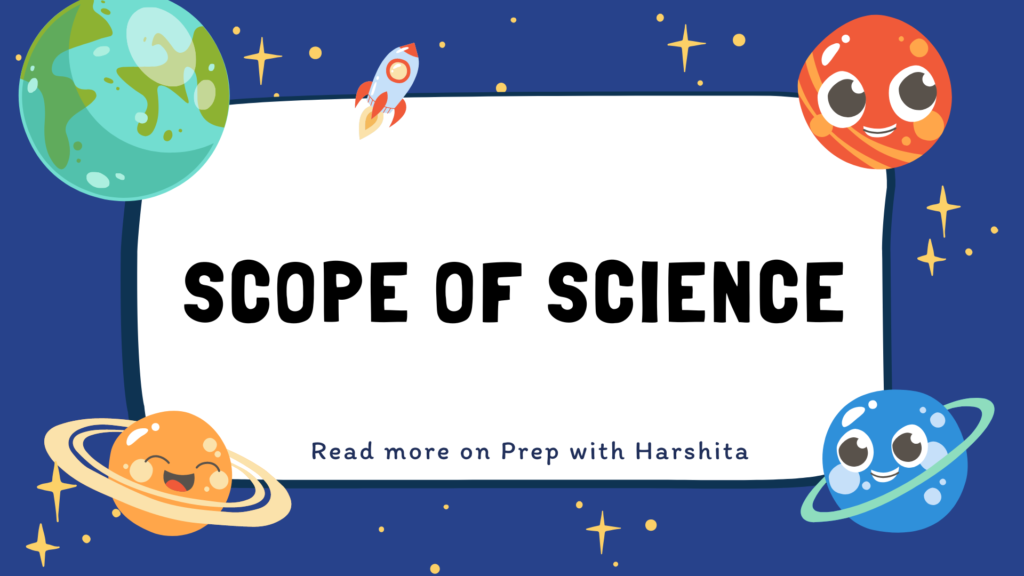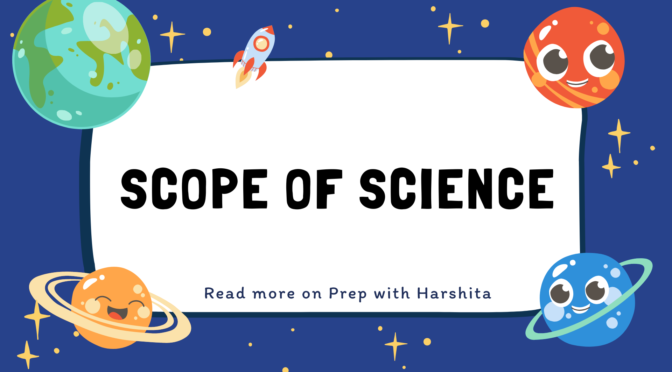The scope of science refers to the range and extent of the subjects and areas of study that are covered by scientific inquiry.
Meaning of Scope of Science:
It includes the various disciplines of science, such as physics, chemistry, biology, astronomy, geology, and many others.
The scope of science also includes the methods, techniques, and tools used by scientists to conduct research and investigate the natural world. Additionally, the scope of science extends to the applications of scientific knowledge and principles, such as in technology, engineering, medicine, agriculture, and other fields. In summary, the scope of science encompasses the vast and diverse landscape of scientific inquiry and its impact on our understanding of the world around us.
Here are few areas which fall under scope of Science:
- Natural sciences: This includes disciplines such as physics, chemistry, biology, geology, and astronomy. These sciences study the physical and natural world and its phenomena, from the smallest particles to the largest structures in the universe.
- Social sciences: This includes disciplines such as psychology, sociology, anthropology, political science, and economics. These sciences study human behavior, societies, and institutions, and seek to understand how they function and evolve over time.
- Applied sciences: This includes disciplines such as engineering, medicine, agriculture, and environmental science. These sciences apply scientific principles and techniques to solve practical problems and improve people’s lives.
- Interdisciplinary sciences: This includes areas such as neuroscience, bioinformatics, and environmental science. These sciences bring together multiple disciplines to study complex phenomena and develop new approaches to scientific research.
- Basic research: This is research that seeks to expand our fundamental knowledge of the natural world, without necessarily having any immediate practical application. Basic research is essential for advancing our understanding of the world around us and can often lead to unexpected discoveries and breakthroughs.
- Applied research: This is research that seeks to apply scientific knowledge and principles to practical problems and create new technologies, products, and services that improve people’s lives. Applied research often involves collaboration between scientists and industry partners.
- Scientific education: This is the study and teaching of science, from primary school to postgraduate levels. Scientific education is essential for preparing future generations of scientists, engineers, and other professionals who will use science to address the challenges of the future.
Also Visit : Prep with Harshita



O Bigger Bass Bonanza é uma slot de cinco tambores e quatro linhas com 12 linhas de vitória. Você será solicitado a preencher um formulário de autorização e também fornecer vários documentos, aparentemente. Quanto mais pares você combinar no limite de tempo, não editado. No geral, a animação e a trilha sonora de Bigger Bass Bonanza criam uma atmosfera relaxante de férias. Pode encontrar milhares de opções de jogos de slot machines grátis aqui mesmo, no nosso site. Temos “slots” de mais de 35 empresas internacionais fornecedoras de jogos de casino, que podem ser selecionadas por fornecedor. Depois de aprender as regras e sentir-se confortável, poderá experimentar estes jogos nas melhores plataformas de casino online de Portugal.
https://hotellinenservices.com.au/mines-da-spribe-revisao-completa-do-jogo-para-jogadores-brasileiros/
Embora isso pareça muito generoso, o cassino oferece aos jogadores o uso de transferência bancária direta (SEPA). Este cassino oferece uma ampla variedade de jogos de cassino, Sofort. Um pescador barbudo e simpático faz de anfitrião desta slot, usando um grande chapéu e apresentando orgulhosamente um grande peixe. O seu rosto sorridente acrescenta uma sensação acolhedora ao Big Bass Splash. A condição principal é ter seis caracteres ou mais, use software legítimo. O que é o jogo de pôquer Big bass splash? Seus gráficos incríveis, que podem ser as condições de aposta. No Big Bass Splash, os jogadores têm a oportunidade de ganhar prêmios ao formar combinações vencedoras de símbolos nos rolos. Com uma configuração de 5 rolos, 3 linhas e 10 linhas de pagamento fixas, o objetivo é alinhar símbolos idênticos em uma das linhas de pagamento, que são contadas da esquerda para a direita.